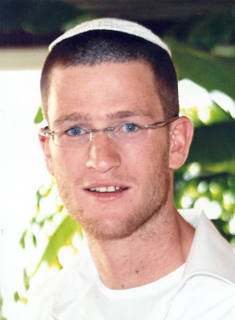Date of Birth: 5.3.1986
Place of residence: Netzarim (Yevul)
Place and date of death: Killed in the Second Lebanon War, 12.8.2006
Place of burial: Mt. Herzl Cemetery, Jerusalem
Age at time of death: 20
Survived by: a wife, a daughter, parents, brothers and sisters

Amsa was born in the Beit Meir community near Jerusalem. His birth is remembered as a very happy and exciting event. He was a loved and spoiled child. At the age of 7 his family moved to the community of Netzarim in Gush Katif.
In elementary school it was discovered that, despite being an intelligent boy, he had learning difficulties. He found it hard learning in the regular school framework. At the end of 10th grade, he decided to leave the Mitzpe Ramon religious high-school and search for greater meaning in life, as well as put his religious faith to the test. For a short while he experienced a secular life-style and simultaneously investigated his beliefs. Anyone who met him during that period knew about the many doubts he was going through. A close friend of his from Netzarim relates how in one of their conversations Amsa said “I have a large soul; if I don’t put on tefillin I feel terrible.” His friends from Tzur Yisrael describe how during Bible classes he would constantly ask questions regarding one’s faith.
At the age of 18½ he met Yonat who started studying in the girls’ Midrasha in Ofra. Amsa resumed observing the commandments, and they decided to live in Ofra. Amsa had returned home, in more than one meaning. He did a lot of charity work. Following their marriage, he would invite single guys to their home for a meal, and whenever he saw a vehicle stuck on the road, he’d stop to help.
Amsa was an idealist in the military as well as the settler meaning of the word. He had ambitions of founding a hilltop community named “Bnei Adam” following his army release and establishing an agricultural farm. He loved the Land, and it bothered him intensely when his family was expelled from Netzarim – he debated whether to remain in the army. He decided to stay in the IDF, since he thought that the Israeli army is a value which expresses Israeli sovereignty in the process of the Israeli redemption. He stayed in the army knowing that he would only carry out those orders which don’t go against religious law. He was determined to go to battle and help defend the nation, and encouraged his friends by quoting the Rambam how one who goes to battle should put his trust in G-d and not fear or think of anything else.






